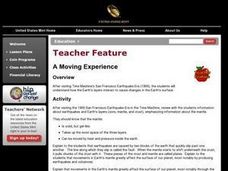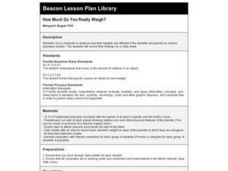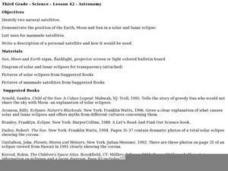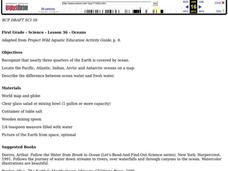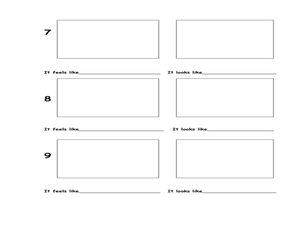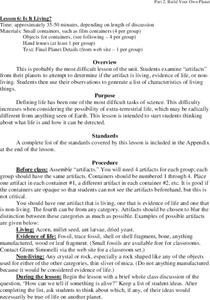Curated OER
Destination Mars!
Fifth graders view Mysteries of Earth & Mars Video on DVD and record thoughts in their online journal. They record data in a spreadsheet about each planet then form a theory of the best time to launch a space craft from Earth to land...
Curated OER
Mission Planning: Geography
Students investigate the use of latitude and longitude to locate specific locations on Earth and evaluate that location as a potential landing site for researchers, terrestrial or alien space missions.
Curated OER
Mars
First graders listen as the teacher reads a copy of the WEEKLY READER that talks about Mars and ask questions accordingly. They again listen as a section about Earth is read from the magazine. Now, the class orally compare and contrast...
Curated OER
Best of the Solar System
Students visit a site which provides images to be analyzed. Notes are taken and planets are named based on observed features and observations. Using peer review, they try to determine the identity of the planets. They are free to browse...
Curated OER
Water Quality
In this unit of lessons, 2nd graders examine the water quality of the water on the planet. They discover how much water is on the planet and how to conserve their water usage.
Curated OER
A Moving Experience
Students visit Time Machine's San Francisco Earthquake Era. They understand how the Earth's layers interact to cause changes in the Earth's surface. They review information about earthquakes and Earth's layers.
Curated OER
Polar Caps: Image Processing Tutorial
Students utilize computer image processing techniques to measure the size of Earth's polar ice caps and analyze various phenomena visible on planetary images.
Curated OER
Out of This World
Students take a mission to Mars. In this space science lesson, students listen a lecture about space travel to Mars and the planet itself. Students then create timelines of exploration and write poetry about their ideal planet.
Curated OER
Mars Calendar Project
Students design a calendar that displays time on Mars. They explore the differences between time on Earth and time on Mars while making the calendar.
Curated OER
The Path of the Sun, the Ecliptic
High schoolers are introduced to the ecliptic, the zodiac and the apparent motions of the Sun, Moon and planets across the sky.
Curated OER
Let's Build a City In the Solar System
Sixth graders explore the solar system. Using the Internet, 6th graders gather information about planets in our solar system. Students participate in an activity to determine where they should build the first city in space. They create a...
Curated OER
How Much Do You Really Weigh?
Sixth graders check to see how their weights differ if they weighed themselves on different planets. They record their findings on a data sheet.
Curated OER
Our Home in the Milky Way
Young scholars gain appreciation of the vastness of our galaxy by viewing an applet about the Milky Way. Students hypothesize about how long it would take to get from Earth to Pluto.
Curated OER
Science - Lesson 42 - Astronomy
Third graders demonstrate the position of the Earth, Moon, and Sun in a solar and lunar eclipse. They list uses for manmade satellites and write a description of how a satellite would be use.
Curated OER
Extra Terrestial Excursions
Fourth graders determine how long it would take to fly to each of the planets in the solar system. They do two calculations: one, if they were using conventional jet, the other if they were using the fastest spacecraft possible.
Curated OER
Collecting Electromagnetic Radiation
Students using different experiments and activities explore electromagnetic radiation and the effect on the Earth.
Curated OER
"Space" Investigations
Sixth graders understand the patterns of change observable on Earth as a result of the movement of the different bodies in the solar system. They identify the physical characteristics of the different components of the solar system.
Curated OER
Space Presents Problems
Students use the internet to research problems related to space. They complete a questionaire to direct their research before beginning. They create a database of moon and planet characteristics.
Curated OER
Oceans
First graders recognize that nearly three quarters of the Earth is covered by ocean. They locate the Pacific, Atlantic, Indian, Arctic and Antarctic oceans on a map. They describe the difference between ocean water and fresh water.
Curated OER
As the World Turns
Third graders read books and participate in class discussions about the motion of the stars and planets and moons in relation to the Earth. In small groups, 3rd graders act out these movements to music.
Curated OER
Exploring Marine Objects
Learners identify the sources of water on Earth. In this life science lesson, students list the different plants and animals that live in the ocean. They explore marine objects in the lab and draw them.
Curated OER
Is It Living?
Students investigate the definition of life and alive in the context of a unit that is involved with building their own planet. They participate in a class discussion about defining life, and in small groups analyze artifacts to...
Curated OER
Discovering a Law of Space Physics
Learners use data collected by an astronomer to determine the relationship between the time it takes the planet to orbit the sun and the average radius of the planet's orbit around the sun. Students use trial and error to find the...
Curated OER
Roaming Biomes
Students use the Internet to research the capabilities of earth-observation satellites. Using the information, they write a report on how remote-sensing technology is used to measure the impact of climate change. They identify the...
Other popular searches
- Planet Earth Dvd Series
- Planet Earth and Bbc
- Planet Earth Seasons
- Planet Earth and Beyond
- Bbc's Planet Earth
- Planet Earth Dvd
- Bbc Planet Earth
- Planet Earth Ocean
- Extreme Planet Earth
- Planet Earth Great Plains
- The Planet Earth
- Planet Earth Jungles







